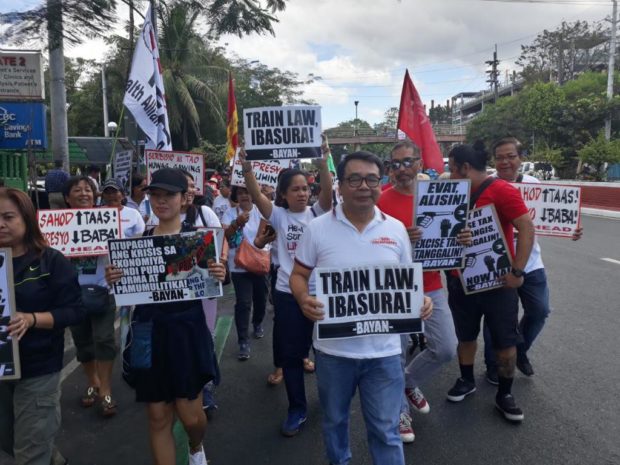Colmenares tells Duterte: It’s possible to lower oil prices

Credit to Author: eestopace| Date: Tue, 12 Feb 2019 08:50:14 +0000
MANILA, Philippines — Bayan Muna chair and senatorial candidate Neri Colmenares has contradicted President Rodrigo Duterte’s recent statements on the high cost of oil products, saying that the government can implement measures to lower fuel prices.
Colmenares made the remarks during a rally along East Avenue on Tuesday, a day after Duterte said he could not do anything about oil prices even if the people ‘hang’ him.
“We beg to disagree. We can do a number of things to at least mitigate or at most stop shocking oil price hikes in the country,” the former lawmaker said during the first day of the campaign.
“In fact, we have filed bills to achieve that since Bayan Muna was elected to Congress, but the measures we filed just gathered dust,” he added.
On Monday, Duterte told farmers in Buluan, Maguindanao that because the country has no oil resources, prices are bound to increase whenever the global market prices go up.
READ: Duterte on high fuel prices: Nothing I can do ‘even if you hang me’
However, Colmenares stressed that Duterte could push for the suspension of the Tax Reform for Acceleration and Inclusion (TRAIN) law, which imposed an additional P4.50 worth of excise taxes on fuel such as gasoline and diesel.
Or the President could mark the bills as urgent so that Congress would pass it, according to Colmenares.
“Also President Duterte can immediately suspend or scrap the TRAIN law and this would considerably lower oil prices. He can also set as priority bills those we filed to control oil prices,” he added.
According to Bayan Muna, they have filed House Bill 1760, which seeks to renationalize oil company Petron; House Bill 3676, which would have regulated the downstream oil industry; and House Bill 3678 or the centralized procurement of petroleum in the country.
Colmenares and Bayan Muna Rep. Carlos Zarate have called on the House leadership to prioritize these bills to protect Filipinos from increasing oil prices.
“Up to 95 percent of the country’s petroleum requirements are imported, rendering the country exceedingly vulnerable to the dictates of big transnational corporations,” Zarate explained.
“The worst implication of this is that our severe dependence on such corporations, which control not only the importation, refining, and retailing of crude and petroleum products from abroad, but also control the exploration, exploitation, refining, retailing, and even re-exportation of our country’s indigenous petroleum and petroleum-based products,” he added. /ee
Click here for more elections stories.